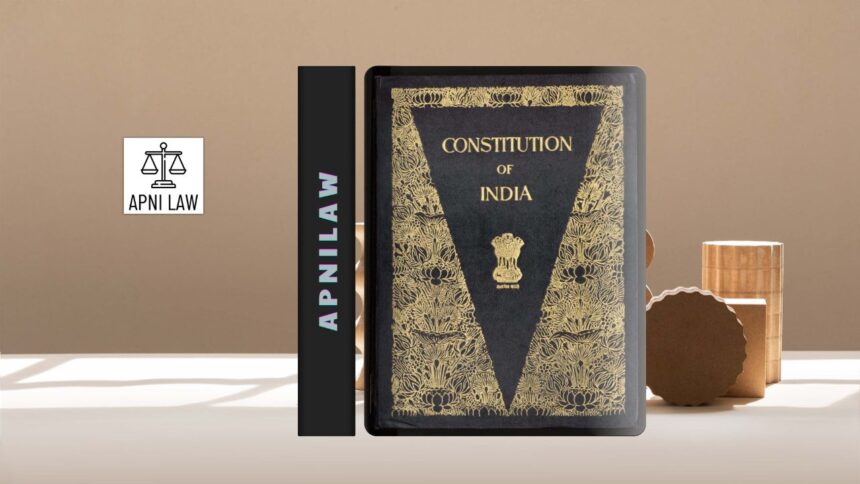Introduction
The Indian Constitution promises justice, equality, and dignity for all. Among the Fundamental Rights, Article 15 plays a crucial role by directly addressing discrimination. It prevents the State from treating citizens unfairly based on religion, race, caste, sex, or place of birth. At the same time, it allows special measures to uplift socially and educationally disadvantaged groups. This balance makes Article 15 a powerful tool for building an inclusive society.
Understanding Article 15 is essential because it reflects the spirit of India’s democracy, equal respect for every citizen, while recognizing the need to correct historical injustices.
Meaning of Article 15
Article 15 prohibits the State from making any law or policy that discriminates against citizens on specific grounds. These grounds include religion, race, caste, sex, and place of birth. The provision ensures that no individual is denied access to public spaces, opportunities, or benefits because of identity.
At the same time, Article 15 does not mean the State must treat everyone identically in all situations. It gives space for protective discrimination, where special steps can be taken to uplift weaker sections of society. This makes equality not just formal but also substantive.
Key Provisions of Article 15
Article 15 has several clauses that explain its scope. The first clause stops the State from making discriminatory laws. The second clause extends this ban to public places such as shops, restaurants, and wells, ensuring access for all citizens.
Later amendments expanded Article 15 to allow reservations for socially and educationally backward classes, Scheduled Castes, Scheduled Tribes, women, and children. For example, Article 15(3) empowers the State to make special provisions for women and children, while Article 15(4) and 15(5) allow affirmative action in education and other fields.
These provisions show that the Constitution is flexible, adapting to the realities of Indian society while keeping equality at its core.
Protective Discrimination and Social Justice
The idea of protective discrimination is central to Article 15. Equality cannot be achieved merely by treating everyone the same; it requires addressing deep-rooted social inequalities. For instance, centuries of caste discrimination left Scheduled Castes and Scheduled Tribes socially and economically disadvantaged.
By permitting reservations and other special measures, Article 15 ensures these groups have better access to education, jobs, and public resources. This system has been one of the most debated but also one of the most impactful tools of social justice in India.
Landmark Judgments on Article 15
The judiciary has played a key role in interpreting Article 15. In State of Madras v. Champakam Dorairajan (1951), the Supreme Court struck down caste-based reservations in educational institutions. However, this led to the First Constitutional Amendment, which inserted Article 15(4) to allow special provisions for socially and educationally backward classes.
In Indra Sawhney v. Union of India (1992), the Court upheld reservations for Other Backward Classes but placed a 50% cap on total reservations. This judgment highlighted how Article 15 balances equality with affirmative action.
More recently, the 103rd Constitutional Amendment (2019) introduced 10% reservation for Economically Weaker Sections (EWS), extending the scope of Article 15 further. Courts are still examining its compatibility with equality principles.
Practical Impact of Article 15
Article 15 shapes everyday life in India. It ensures equal access to public spaces, educational institutions, and opportunities. Without it, caste-based exclusion, gender bias, and religious discrimination could continue unchecked.
It also underpins government policies such as reservations in schools and colleges, schemes for women’s empowerment, and programs for marginalized communities. While debates over the extent and fairness of reservations continue, Article 15 remains a guiding light for achieving true social justice.
Criticism and Challenges
Article 15, despite its noble goals, faces criticism. Some argue that reservations compromise merit and create reverse discrimination. Others believe that without such measures, centuries of social and economic inequality cannot be undone.
Another challenge lies in balancing different forms of disadvantage. For example, economically weaker groups within forward communities also demand protection, which led to the EWS quota. Courts and policymakers continue to navigate these tensions while staying true to the Constitution’s promise of equality.
Contemporary Relevance
In today’s India, Article 15 remains highly relevant. Gender equality debates, demands for OBC and EWS reservations, and questions about religious freedoms all connect to this Article. As society evolves, so does the interpretation of equality.
The judiciary, legislature, and public debates constantly test the limits of Article 15. Yet, its core principle that no citizen should face discrimination for identity, remains unshaken.
Frequently Asked Questions
What does Article 15 prohibit?
Article 15 prohibits the State from discriminating against citizens on the basis of religion, race, caste, sex, or place of birth.
Does Article 15 allow reservations?
Yes. Through its later clauses, Article 15 allows special provisions for backward classes, Scheduled Castes, Scheduled Tribes, women, children, and even Economically Weaker Sections.
Why is Article 15 important?
It ensures fairness by preventing discrimination while also enabling protective measures for disadvantaged groups, making equality both real and practical.
Conclusion
Article 15 of the Indian Constitution is a cornerstone of equality and justice. By banning discrimination and allowing affirmative action, it reflects the framers’ vision of an inclusive society. The Article balances the need for equal treatment with the reality of social and historical inequalities.
Over the decades, Article 15 has empowered millions through access to education, jobs, and opportunities. Though debates about its scope and application continue, its role in shaping a fairer India cannot be denied. The prohibition of discrimination remains a promise and a challenge, one that keeps India’s democracy moving closer to justice for all.
For any specific query call at +91 – 8569843472







